- Home
- Muriel Spark
Complete Poems: Muriel Spark Page 2
Complete Poems: Muriel Spark Read online
Page 2
Why did they say ‘Good morning’?
Well, I said ‘Good morning’ back to them,
This in my dream being the right thing to do.
Verlaine Villanelle
Like poor Verlaine, whom God defend,
I see the sky above the roof,
And write my book till summer’s end.
When tree, town, bell and birdnote blend,
I feel, since summer sails aloof
Like poor Verlaine, whom God defend,
Who went to jail but did not mend.
I taste the pity sure enough
And write my book till summer’s end.
I see a tree, and won’t pretend
I’m warped on that nostalgic woof
Like poor Verlaine, whom God defend.
But rue the crooked dividend
These days will yield of galley-proof,
And write my book till summer’s end.
Therefore I see the sky and spend
An hour of lyrical reproof,
Like poor Verlaine, whom God defend,
And write my book till summer’s end.
Edinburgh Villanelle
These eyes that saw the saturnine
Glance in my back, refused the null
Heart of Midlothian, never mine.
Hostile High Street gave the sign.
Hollyrood made unmerciful
These eyes that saw the saturnine
Watchmen of murky Leith begin
To pump amiss the never-full
Heart of Midlothian, never mine.
Withal they left the North Sea brine
Seeping the slums and did not fool
These eyes that saw the saturnine
Waters no provident whim made wine
Fail to infuriate the dull
Heart of Midlothian, never mine.
Municipal monuments confine
What ghosts return to ridicule
These eyes that saw the saturnine
Heart of Midlothian, never mine.
Holy Water Rondel
For salt, no word seems apposite;
Its common wisdom would defy
All praise, so far as meets the eye,
Salt is so meek a hypocrite.
And not the most selective wit
Has words to measure water by,
Because, so far as meets the eye,
Water is exquisite.
But cited sacerdotally,
Multiple evils up and quit,
Which proves that water and salt commit
Pathetic faults beyond the eye;
And shows a happy flaw whereby
The fabric is bereft of it,
Since there is nothing left of it
But mercies more than meet the eye.
Therefore I rate the creatures high
Whose salt and watery features knit
So strict and strange a composite
Of blessings and of brine thereby.
No wonder that the clergy ply
The people every week with it,
Who are of virtue infinite
So far as meets the eye.
The Creative Writing Class
‘There is,’ he declared.
‘Really?’ she grinned.
‘Undoubtedly,’ he stated.
‘Tomorrow,’ she burbled.
‘A majority,’ he chortled.
‘The statues?’ she enquired.
‘Public health,’ he opined.
‘The signature,’ she ventured.
‘Miss Universe,’ he emoted.
‘The confederation,’ she growled.
‘Hostile ethics!’ he exclaimed.
‘The Tears of Time,’ she choked.
‘Everything entire,’ he warbled.
‘It’s a mere obsession,’ she roared.
‘Develop the wolf,’ he demanded.
‘Done,’ she snarled.
‘On with the job,’ he guffawed.
‘Not unanimous,’ she yelled.
‘You’re breaking my jaw,’ he groaned.
‘Silence!’ she sneered.
Authors’ Ghosts
I think that authors’ ghosts creep back
Nightly to haunt the sleeping shelves
And find the books they wrote.
Those authors put final, semi-final touches,
Sometimes whole paragraphs.
Whole pages are added, re-written, revised,
So deeply by night those authors employ
Themselves with those old books of theirs.
How otherwise
Explain the fact that maybe after years
Have passed, the reader
Picks up the book—But was it like that?
I don’t remember this . . . Where
Did this ending come from?
I recall quite another.
Oh yes, it has been tampered with
No doubt about it—
The author’s very touch is here, there and there,
Where it wasn’t before, and
What’s more, something’s missing—
I could have sworn . . .
That Bad Cold
That hand, a tiny one, first at my throat;
That thump in the chest.
I know you of old, you’re a bad cold
Come to stay for a few days,
Unwanted visitor—a week perhaps.
Nobody asked him to come. (Yes,
He is masculine, but otherwise
Don’t try to parse the situation.)
Everything stops. Perhaps
He is providentially intended to
Make cease and desist an overworking
State of mind. Yes, there is a certain
Respite. Friends mean merely a bed
And a hot drink. Enemies and all
Paranoias, however justified, lose their way
In the fog. And the desk diary
Lies open with a vacant grin.
Leaning Over an Old Wall
Leaning over an old wall, gazing
into a dark pool, waiting like a moonling to see
only the water traffic, fish and frogs
I saw my image stare at me, appraising.
Suddenly a voice spoke from a stone
in the bed of the pool, saying
it is the pebble on the path you tread,
it is the tomb’s substance,
it pillows your head,
it is the cold heart lamenting alone,
it is all these things, the stone said.
A willow moaned, it is your despair,
it is your unrest and your grieving,
your fears that have been and those that are to be,
it is your unbelieving
and the wanhope of your days, said the tree.
And the roots of the willow, lying
under the bed of the pool were crying,
it is the twisted cord that feeds this tree
which is your clay and entity;
it is the filament that fed your birth;
from your wanton seed
into the faithful earth
impulsive tendons lead.
But the green reeds sang, it is the voice
of your life’s joy.
It is the green word that springs
amazing from your frost, it flings
arms to the sky so that the clouds rejoice
and the sun sings.
Flower Into Animal
This is the pain that sea anemones bear
in the fear of aberration but wilfully
aspiring to respire in another
more difficult way, and turning
flower into animal interminably.
It is a pain to choke with, when the best
of a species gets lost somewhere.
Different, indifferent pain—
to be never the one again to act like the rest
but answer to the least of another kind;
to be here
no more to savour nor desist,
but to identify maybe the grains of sand
and call anonymous grasses by their name,
to find remembrance if the streets run seabound;
when the tide enters the room, when the roof gives flower
cry Credo to the obdurate weed.
And to have to put up with the pain and process,
nor look back to delight the eyes
that ache with the displacement of all sights.
And to have to alter the trunk of a tree to a dragon
if it should be required, or the river to a swan.
Abroad
Abroad is peculiar names above the shops.
Strange, too, the cookery and the cops. The people
Prattle with tongues there, they rattle
Inscrutable money, and with foreign eyes
Follow your foreign eccentricities.
Going up to Sotheby’s
This was the wine. It stained the top of the page
when she knocked over the glass accidentally. A pity, she said,
to lose that drop. For the wine was a treat.
Here’s a coffee-cup ring, and another. He preferred coffee to tea.
Some pages re-written entirely, scored through, cancelled over
and over
on this, his most important manuscript.
That winter they took a croft in Perthshire,
living on oats and rabbits bought for a few pence from
the madman.
The children thrived, and she got them to school daily,
mostly by trudge.
He was glad to get the children out of the way, but always
felt cold
while working on his book. This
is his most important manuscript, completed 1929.
‘Children, go and play outside. Your father’s trying to work.
But keep away from the madman’s house.’
He looked up from his book. ‘There’s nothing
wrong with the madman.’ Which was true.
She typed out the chapters in the afternoons. He looked
happily at her.
He worked best late at night.
‘Aren’t you ever coming to bed? I often wonder,
are you married to me or to your bloody book?’
A smudge on the page, still sticky after all these years.
Something greasy on the last page.
This is that manuscript, finished in the late spring,
crossed-out, dog-eared; this, the original,
passed through several literary hands while
the pages she had typed were at the publishers’.
One personage has marked a passage with red ink,
has written in the margin, ‘Are you sure?’
Five publishers rejected it in spite of recommendations.
The sixth decided to risk his pounds sterling down the drain
for the sake of prestige. The author was a difficult customer.
However,
they got the book published at last.
Her parents looked after the children while the couple went
to France
for a short trip. This bundle of paper, the original manuscript,
went into a fibre trunk, got damp into it, got mouldy and furled.
It took fifteen more years for him to make his reputation,
by which time the children had grown up, Agnes as a
secretary at the BBC, Leo as a teacher.
The author died in ’48, his wife in ’68.
Agnes and Leo married and begat.
And now the grandchildren are selling the manuscript.
Bound and proud, documented and glossed
by scholars of the land, smoothed out
and precious, these leaves of paper
are going up to Sotheby’s. The wine-stained,
stew-stained and mould-smelly papers are
going up to Sotheby’s. They occupy the front seat
of the Renault, beside the driver.
They are a national event. They are going up
to make their fortune at last,
which once were so humble, tattered, and so truly working class.
On the Lack of Sleep
Lying on the roof of everything I listen
To the breath of ambition in her sleep, to the gasp of rancour
Turning in her dream. And the parting of lovers, the
coming together
Of old divisions, the meeting and retreating of partners
Cease, though I do not sleep.
Already I have wandered through fields of Michaelmas
flowers. Tired
As I am, I remember the counting of all souls, think of their
blue faces
Asleep, though I do not cease,
Though I persist into the day without motive as in the first hour
Of my life, tired as I am, I see the innocence I am left with.
Honour yawns, vanity foams in her coma, charity stretches
A sham, luxurious limb.
Until I gather you again when I come into my own,
Lie low, my sleepy fortunes.
The Grave that Time Dug
This is the grave that time dug.
This is the box
that lay in the grave that time dug.
This is the hand
that rapped on the box
that lay in the grave that time dug.
This is the stove
that warmed the hand
that rapped on the box
that lay in the grave that time dug.
This is the child an instant born
that lit the stove
that warmed the hand
that rapped on the box
that lay in the grave that time dug.
This is the pink deceptive thorn
that bled the child an instant born
that lit the stove
that warmed the hand
that rapped on the box
that lay in the grave that time dug.
This is the alderman bound and sworn
that planted the pink deceptive thorn
that bled the child an instant born
that lit the stove
that warmed the hand
that rapped on the box
that lay in the grave that time dug.
The Pearl-Miners
By night I watch a fitful tribe
Along the street advance and halt.
Time and again their limbs describe
A proud protracted somersault.
Blank-eyed beneath the lamp they steer
Compliant hips with hands of chalk.
I know them by their grief, and hear
Convulsions tolling in their talk.
They come, contemptuous and fleet
In tartan jeans, in ochre tights,
To make overt their counterfeit
Drowsy exotic appetites.
They are asleep and cannot rest,
Dismayed in far delirium.
Elaborately they attest
The dreaded labours still to come.
I know them by the lights of fear
On their elliptic faces falling.
This way and that, they haul the gear
And apparatus of their calling.
So obsolete, the block they drag,
So bitterly they drill and grind,
So deep beneath the pavement flag
They dig for pearls and do not find.
So freakish, they descend and storm
The black foundations, and in vain
They rise distracted to perform
Their supplicating rites again.
High-style they flash, akimbo fall,
Entreating on their shaken heads
That pale magnetic mineral
Which lugged them from their sundry beds.
Full-wheel the rounds revolve alike:
The sleepers tur
n, and cheek by cheek,
Dig up the road and do not strike
The lustrous milky seam they seek.
I recognise them by their fear;
So fair the dream, so far the sight.
The lambent virtues are not here
In Kensington of dreadful night.
You boys of amber, quit your load;
You emerald, you marble girls,
Not underneath Old Brompton Road
Nestle the subterranean pearls.
I know these miners comfortless,
And by their pain identify
Pearl within pearl, since I possess
None but my bane to measure by,
None but their sleep to waken me,
None but their sorrow to confide
What pleasures have forsaken me,
None but my foe to be my guide.
I reckon only by their lack,
Rich within perfection furled,
And, by the sepulchre they hack,
Perceive the living underworld.
Here they have come, my fake, my lost,
My own familiars to their grave.
By vicious lights like elm-trees tossed,
Their bright pathetic branches wave.
So high the fault, the dream so true;
So low, the lovely mind persists
Immaculate, but not for you,
Dissevered, sad somnambulists.
Omen
Here is the time of watching birds;
senses mingle and show their hands.
Now is the place where the signal stands
that points an omen from both my doors;
though the street shall talk like a hammer,
walls keep silence over my shoulder.
The wrong key in the right door
ponders the portent. Which window
saw where I have been to-morrow?
where I rocked my house on the water;
doors moved like an ark turning
back her face, and this is a meaning.
For the unlucky eye never shall taste
the bright bow of my vision again,
but this error, bitter as brine,
shall blind the eyes that heard the day
before my fairweather foes came,
those that crossed my fingers dumb.
Fault, fault, on both my houses—
Speed, bonny ark, and change your shape
until the ominous birds fly up.
My Kingdom for a Horse
Having considered the place, having decided
There was not room enough, nevertheless

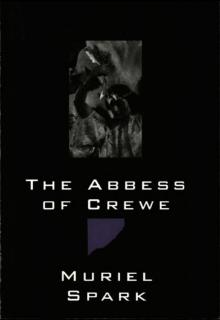 The Abbess of Crewe: A Modern Morality Tale
The Abbess of Crewe: A Modern Morality Tale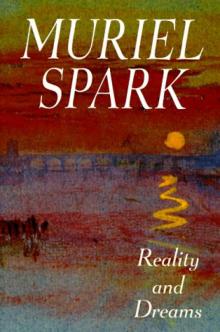 Reality and Dreams
Reality and Dreams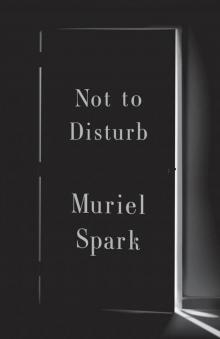 Not to Disturb
Not to Disturb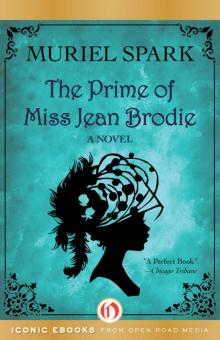 The Prime of Miss Jean Brodie
The Prime of Miss Jean Brodie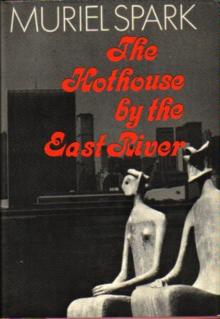 The Hothouse by the East River
The Hothouse by the East River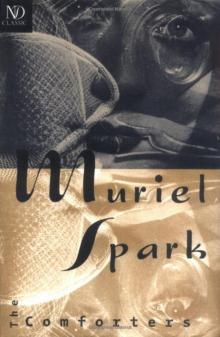 The Comforters
The Comforters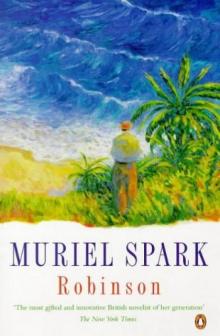 (1958) Robinson
(1958) Robinson Unknown
Unknown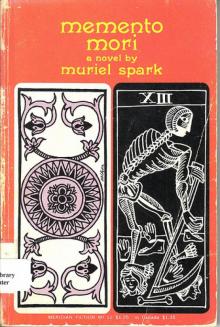 Memento Mori
Memento Mori The Finishing School
The Finishing School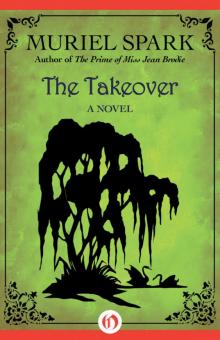 The Takeover
The Takeover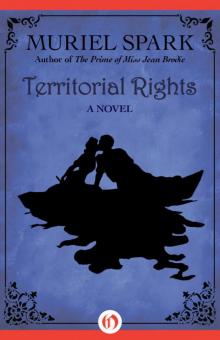 Territorial Rights
Territorial Rights The Complete Short Stories
The Complete Short Stories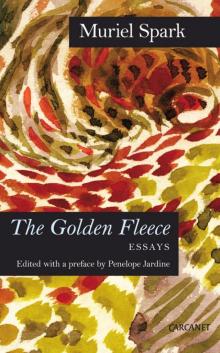 The Golden Fleece: Essays
The Golden Fleece: Essays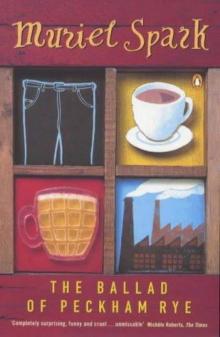 The Ballad of Peckham Rye
The Ballad of Peckham Rye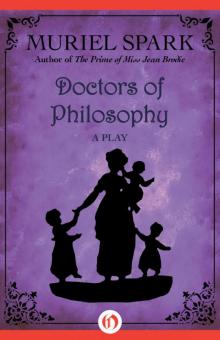 Doctors of Philosophy: A Play
Doctors of Philosophy: A Play The Mandelbaum Gate
The Mandelbaum Gate Loitering With Intent
Loitering With Intent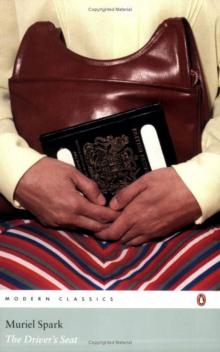 The Driver's Seat
The Driver's Seat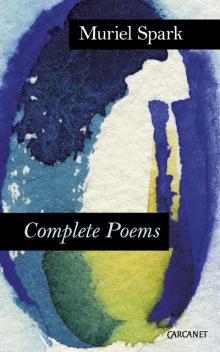 Complete Poems: Muriel Spark
Complete Poems: Muriel Spark Symposium
Symposium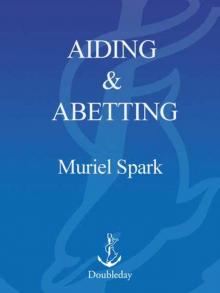 Aiding and Abetting
Aiding and Abetting The Golden Fleece
The Golden Fleece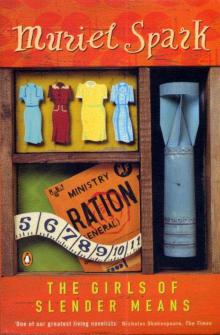 The Girls of Slender Means
The Girls of Slender Means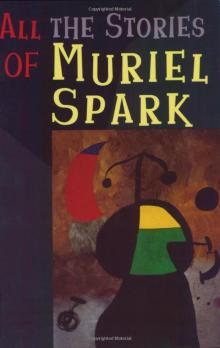 Alice Long’s Dachshunds
Alice Long’s Dachshunds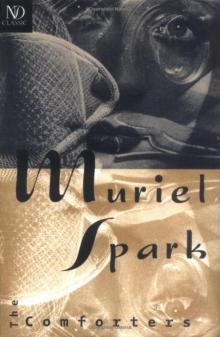 (1954) The Comforters
(1954) The Comforters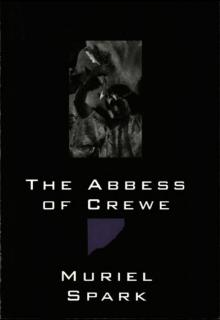 The Abbess of Crewe
The Abbess of Crewe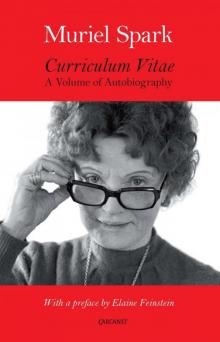 Curriculum Vitae
Curriculum Vitae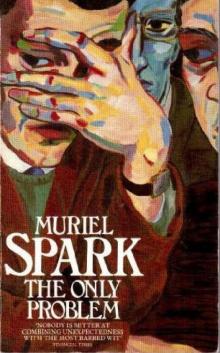 The Only Problem
The Only Problem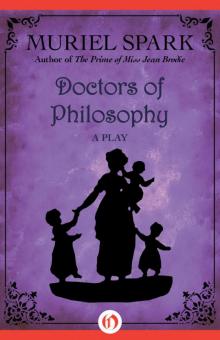 Doctors of Philosophy
Doctors of Philosophy